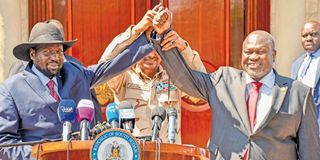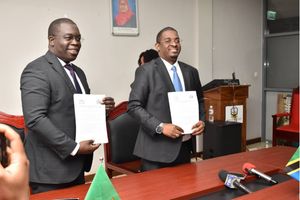Renewed hope for S. Sudan as Machar takes over as VP

In this file photo taken on December 17, 2019 South Sudanese President Salva Kiir (L), South Sudan’s opposition leader Riek Machar (R) and Mohamed Hamdan Daglo (C)”Hemeti”, Sudan’s deputy head of the Transitional Military Council, hold hands together as they speak to media after their peace talk at the State House in Juba, South Sudan. PHOTO | AFP
Juba. South Sudan rebel leader Riek Machar was sworn in as first vice president on Saturday, formally rejoining the government in the latest bid to bring peace to a nation ravaged by war.
President Salva Kiir hailed the “official ending of war” and said peace was now “irreversible” as the new unity government was formed after more than a year of delays and bickering over crucial issues.
It is the third time that bitter foes Machar and President Salva Kiir will attempt to rule together and the pair have many differences yet to iron out as they form the unity government that is a cornerstone of a September 2018 peace deal. “For the people of South Sudan, I want to assure you that we will work together to end your suffering,” Machar said after taking the oath. Machar embraced and shook hands with Kiir after being sworn in.
The rebel leader returns as first vice president. Four other vice presidents from the government and other opposition groups who will also form part of a bloated government of 35 ministers and 550 lawmakers.
The rivals started out as president and deputy at independence in 2011 but Kiir sacked Machar in 2013 and later accused him of attempting a coup against him, sparking a bloody war characterised by ethnic bloodshed between Kiir’s Dinka and Machar’s Nuer communities.
“We must forgive one another and reconcile. I also appeal to the people of Dinka and Nuer to forgive one another,” said Kiir. A 2015 peace deal brought Machar back as vice president and he returned to Juba amid heavy security.
When that deal fell apart in July 2016, the capital was plunged into a brutal battle between rival armies and Machar was forced to flee on foot.
The ensuing war drew in new parts of the country and other local grievances and disputes came to the fore.
After six years of war some 380,000 have died, four million fled their homes and more than half the population is facing severe hunger.
The economy of the oil-rich nation is shattered, infrastructure barely existent, and millions of children are out of school. The September peace deal has lead to the longest period of relative calm since 2013 but fighting continues between government and holdout rebel groups in the Central Equatoria region.
Bloody localised conflicts between communities in the absence of a functioning state have soared.
Machar on Saturday hailed the strengthening of the South Sudanese pound on the back of the formation of the unity government from 320 to 220 pounds to the dollar, saying “this is the dividend of peace.”
And, with around 190,000 people still cowering in United Nations protection camps around the country, the UN special envoy to South Sudan David Shearer said he believed that “we will see lots of people once displaced moving back to their homes.”
- ‘Much more to work through’ -
The formation of the unity government was postponed twice by failure to move forward on forming a unified army, carving out state borders and creating a protection force to assure Machar’s security.
A last-minute deal on the number of states was achieved, although little progress has been made on the other issues. Kiir has said his forces would be in charge of Machar’s protection as a special VIP protection force is still undergoing training.
A compromise by Kiir to cut to 10 the number of states, which he increased unilaterally to 32 after independence, was seen as key in moving towards the creation of the unity government.
However the opposition remains reticent about an additional three “administrative areas” pushed through by Kiir.
“Kiir’s compromise on the states issue paved the way for the two sides to finally move forward, even if the parties have much more to work through in the coming weeks, months, and years,” Alan Boswell, a South Sudan expert with the International Crisis Group (ICG) told AFP.




